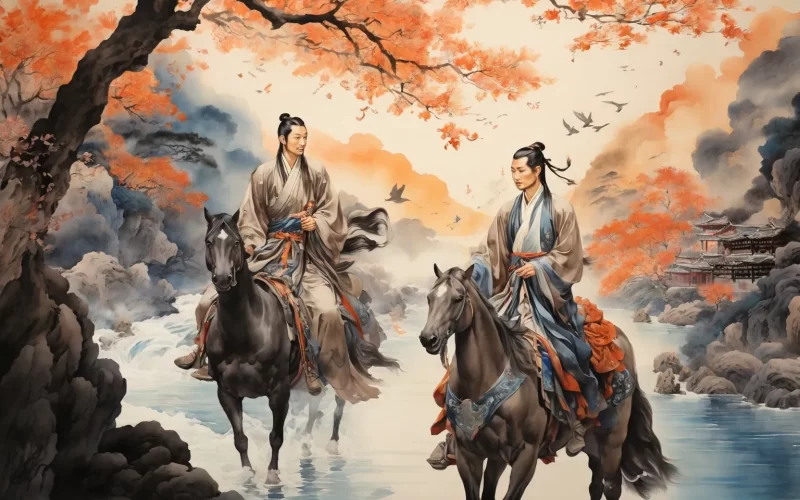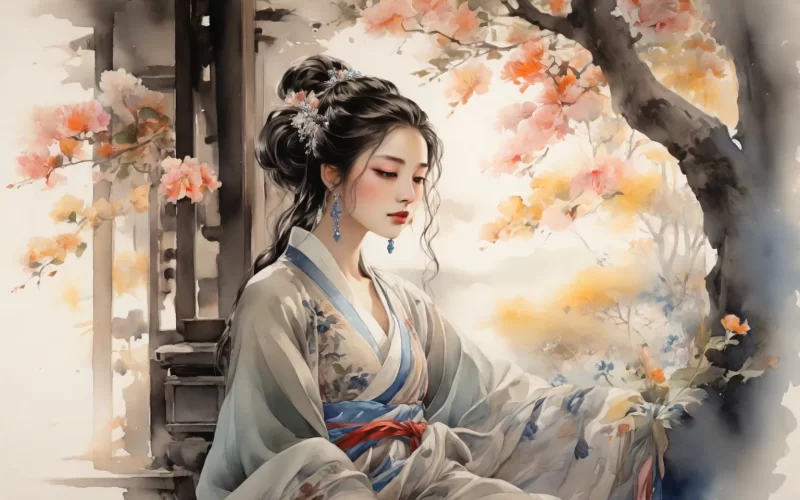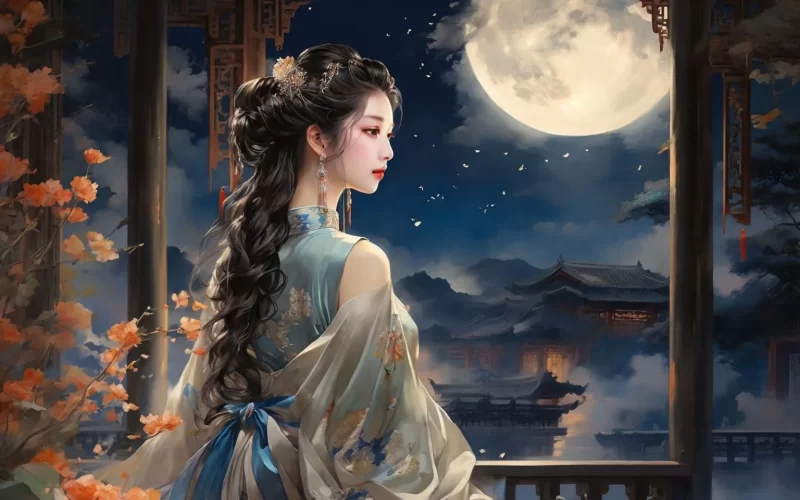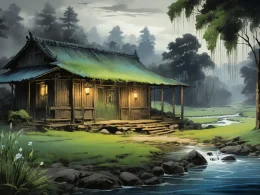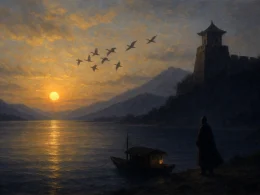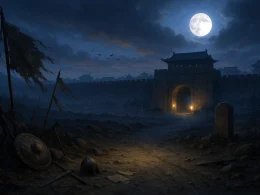What are you thinking as we part from one another,
Pulling in our horses for the stirrup-cups?
Do these tear-streaks mean Wu Valley monkeys all weeping,
Or wildgeese returning with news from Heng Mountain? …
On the river between green maples an autumn sail grows dim,
There are only a few old trees by the wall of the White God City…
But the year is bound to freshen us with a dew of heavenly favour -
Take heart, we shall soon be together again!
Original Poem
「送李少府贬峡中王少府贬长沙」
高适
嗟君此别意何如? 驻马衔杯问谪居。
巫峡啼猿数行泪, 衡阳归雁几封书。
青枫江上秋帆远, 白帝城边古木疏。
圣代即今多雨露, 暂时分手莫踌躇。
Interpretation
This Poem was written by Gao Shi during the Northern Song Dynasty, a period when he was experiencing career setbacks and profound loneliness. This poem, filled with deep emotion, uses the imagery of an autumn night to express his longing and sorrow. Gao Shi's unique style and profound emotional depth make this poem a moving portrayal of solitude, melancholy, and helplessness.
First Couplet: "纷纷坠叶飘香砌,夜寂静,寒声碎。"
Fēn fēn zhuì yè piāo xiāng qì, yè jì jìng, hán shēng suì.
Leaves fall in abundance, drifting onto the fragrant steps; the night is silent, only the cold rustling of leaves breaks the stillness.
This couplet sets the scene with the imagery of falling leaves, creating a cold and desolate atmosphere. The falling leaves symbolize the passage of time and the loneliness of life. The sound of the leaves in the quiet night mirrors the poet's inner sorrow, emphasizing his sense of isolation.
Second Couplet: "真珠帘卷玉楼空,天淡银河垂地。"
Zhēn zhū lián juǎn yù lóu kōng, tiān dàn yín hé chuí dì.
The pearl curtains are rolled up, the jade tower stands empty; the sky is pale, and the Milky Way seems to hang low to the ground.
The "empty jade tower" (玉楼空) reflects the poet's solitude as he gazes at the moon from the high tower. The rolled-up curtains and the pale sky create a scene of desolation and coldness. The Milky Way, hanging low, connects the sky and the earth, further emphasizing the poet's loneliness.
Third Couplet: "年年今夜,月华如练,长是人千里。"
Nián nián jīn yè, yuè huá rú liàn, cháng shì rén qiān lǐ.
Every year on this night, the moonlight is like a silken ribbon, yet the one I long for is always a thousand miles away.
The phrase "every year on this night" (年年今夜) highlights the enduring nature of the poet's longing. The moonlight, though beautiful, only serves to remind him of the distance separating him from his loved one, deepening his sense of sorrow and helplessness.
Fourth Couplet: "愁肠已断无由醉,酒未到,先成泪。"
Chóu cháng yǐ duàn wú yóu zuì, jiǔ wèi dào, xiān chéng lèi.
My sorrow is so deep that even wine cannot numb it; before the wine reaches my lips, tears already fall.
These lines reveal the depth of the poet's pain. His sorrow is so profound that even wine, a traditional means of solace, cannot alleviate it. The tears that fall before he can drink symbolize the overwhelming nature of his grief.
Fifth Couplet: "残灯明灭枕头欹,谙尽孤眠滋味。"
Cán dēng míng miè zhěn tóu yī, ān jìn gū mián zī wèi.
The flickering lamp casts shadows on my tilted pillow; I have come to know the full taste of lonely sleep.
The "flickering lamp" (残灯明灭) and "tilted pillow" (枕头欹) depict the poet's sleepless night, spent alone with his thoughts. The imagery conveys his deep sense of loneliness and the bitter taste of solitude.
Sixth Couplet: "都来此事,眉间心上,无计相回避。"
Dōu lái cǐ shì, méi jiān xīn shàng, wú jì xiāng huí bì.
All this sorrow, whether on my brow or in my heart, cannot be avoided.
In the final couplet, the poet acknowledges that his sorrow is inescapable. It lingers both on his brow and in his heart, a constant presence that he cannot evade. This line underscores the depth and persistence of his grief.
Overall Appreciation
This poem uses the imagery of an autumn night to express the poet's deep longing and sorrow.
The first couplet sets the scene with falling leaves and a silent night, creating a cold and desolate atmosphere that mirrors the poet's inner world.
The second couplet shifts to the empty jade tower and the pale sky, emphasizing the poet's solitude and the vastness of his loneliness.
The third couplet introduces the enduring nature of the poet's longing, as the moonlight reminds him of the distance separating him from his loved one.
The fourth couplet reveals the depth of the poet's pain, as even wine cannot numb his sorrow, and tears fall before he can drink.
The fifth couplet depicts the poet's sleepless night, spent alone with his thoughts, conveying his deep sense of loneliness.
The final couplet acknowledges the inescapable nature of his sorrow, which lingers both on his brow and in his heart.
The poem's strength lies in its ability to blend vivid imagery with deep emotional resonance. Gao Shi's use of natural imagery and his subtle portrayal of inner emotions create a powerful and lasting impression.
Writing Characteristics
- Vivid Imagery and Symbolism
The poem uses imagery like falling leaves, the empty jade tower, and the flickering lamp to convey the poet's inner world and his sense of loneliness. - Emotional Depth and Resonance
The poem's emotional depth is conveyed through its subtle and nuanced portrayal of the poet's sorrow and longing. - Structure and Progression
The poem progresses from the external scene to the poet's inner emotions, creating a seamless blend of scene and emotion.
Insights
This poem offers a profound meditation on the nature of longing and sorrow. Gao Shi's portrayal of his deep emotional pain resonates with anyone who has experienced the ache of separation and the weight of loneliness.
The poem also highlights the importance of acknowledging and expressing our emotions. Gao Shi's willingness to confront his sorrow and give it voice serves as a reminder of the power of emotional honesty.
Ultimately, "To the Tune of 'Su Mu Zhe'" is a meditation on the human experience of longing, sorrow, and the search for solace. It challenges us to reflect on our own lives and to seek out the beauty and meaning in the relationships and experiences that truly matter.
About the poet
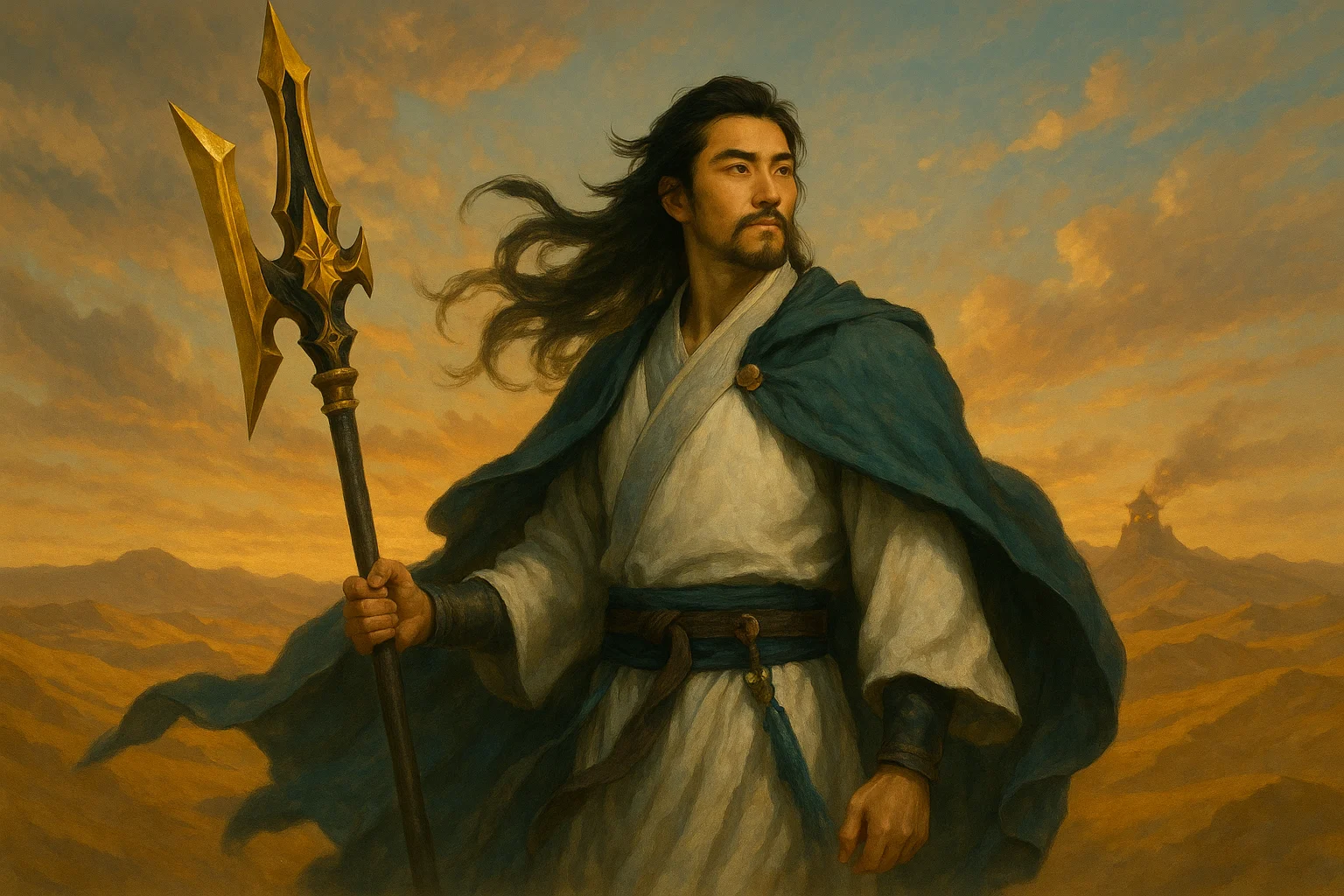
Gao Shi (高适), 706 - 765 AD, was a native of Jing County, Hebei Province. In his early years, his family was poor, and he was disappointed in his career. He was famous for his border poems, which are not only numerous and wide in subject matter, but also present a unique style and perspective.






